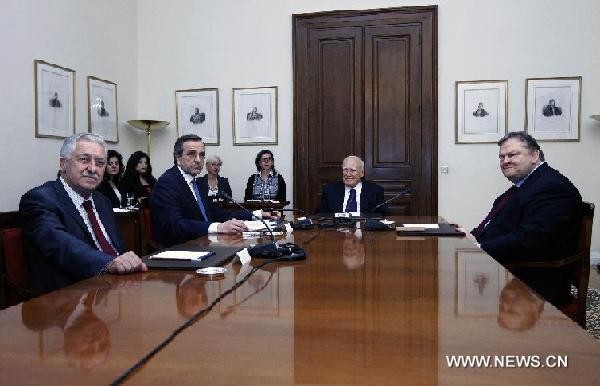Spiraling political crisis in Greece
Hong Van -
 |
Greek President Karolos Papoulias (2nd R) meets with Antonis Samaras (2nd L), president of the conservative New Democracy party, Evangelos Venizelos (1st R), president of PASOK party and Fotis Kouvelis (1st L), president of the Democratic Left party, at the Presidential Mansion, in central Athens, May 14, 2012.
|
(VOVworld) - Greek President Karolos Papoulias was forced to hold negotiations over the past 2 days with three heads of pro-European bailout parties to discuss the establishment of a coalition government ahead of the country’s upcoming elections. But Papoulias’ effort is likely in vain as the parties hold differing views on Athens' current austerity measure. This means Greece may have to hold another election and crush out of the Eurozone, seriously impacting the European Union.
The Greek President’s negotiations to set up a coalition government prove that Greece is in a serious crisis. Papoulias’ effort is the last resort to avoid an early election ahead of the one scheduled for June. Alexis Tsipras, President of the far-left party Syriza, one of the three parties with the most votes in the Parliamentary election a week ago, has refused to work with any parties that plan to implement measures demanded as part of the international financial bailout. Syriza wants Greece to withdraw from the agreement it had signed with the European Union and the International Monetary Fund in 2010. In 2 years of the austerity, Greece’s economy has seen no growth and has even fallen back further. Its economy is projected to drop an additional 6% this year and remain flat next year. Greece only has enough money to pay salaries and pensions until June. Meanwhile, the unemployment rate reached 21.7% in February. It seems obvious that Greece will have to hold a new election. But even another election may fail to resolve the current political deadlock. The latest poll suggests that in the next election, Syriza could win nearly 24% of the vote, followed by the central-right New Democracy Party with 17.4% and the Socialist PASOK with less than 11%. Once again no party will have a majority with which to establish a government.
Without a united government, Greece will probably have to withdraw from the Eurozone. The tumbling euro could lead other countries spiraling into crisis. The political turmoil has spooked markets around the world. Heavy losses in Europe and the US on Monday were followed by falls in Asia on Tuesday morning. In Tokyo, one Euro was equal to 1,28 USD and 103.07 yen. Economist Daisuke Karakama of the Mizuho Corporate Bank says that the Euro will drop below 1.25 USD and 100 yen if the anti-bailout leftist parties in Greece win a significant victory in the coming election.
Hong Van